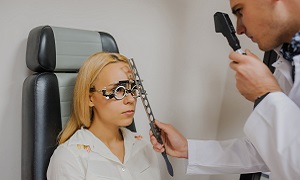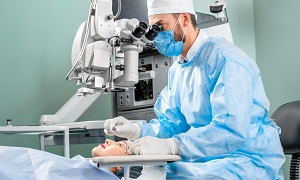Best Doctors in India for Keratoplasty
Best Hospitals in India for Keratoplasty
- City: Mumbai, India
Hospital Highlights:
- Fortis Hiranandani hospital was established in 2007.
- The hospital is an advanced tertiary care, multi-specialty hospital equipped with 149 beds.
- The hospital is equipped with a super ICU to provide emergency medical care to critically ill patients.
- The hospital is NABH accredited.
- The critical care facility in the hospital is augmented with the state-of-the-art facilities that facilitate speedier diagnosis and efficient monitoring.
- The hospital provides specialty medical services in cardiology, orthopedic science, pediatric science, neurology, diabetic care, urology, nephrology, ENT, obstetrics, gynecology, cosmetic surgery, bariatric surgery, neuro and spine care.
- City: Gurugram, India
Hospital Highlights:
- W Pratiksha Hospital, Gurugram, is one of the best hospitals in the NCR region. It is also a top hospital in India for IVF. Since its inception, the hospital has performed over 5500 successful IVFs. The hospital also specializes in gynecology.
- With over 20 years of experience in providing quality healthcare, the hospital is known as one of the most trusted and valued health providers in India.
- Equipped with world-class medical facilities and advanced technology, the hospital’s doctors and clinicians also have a track record of delivering excellent results. The hospital is also known for focusing on preventive well-being as much as on curative treatment.
- The hospital has earned the trust of its patients, by providing the best available treatments at affordable costs.
- City: Gurugram, India
Hospital Highlights:
- Paras hospital was established in 2006 and is the 250 bedded flagship hospital of Paras Healthcare.
- The is supported by a team of doctors of international and national repute.
- The hospital is NABH accredited and also the first hospital in the region to have a NABL accredited laboratory.
- The hospital provides specialty medical services in around 55 departments including Neurosciences, Joint Replacement, Mother & Child Care, Minimal Invasive Surgery, Gynecology and Obstetrics, Ophthalmology, Dermatology, Endocrinology, Rheumatology, Cosmetic and Plastic surgery.
- The hospital is equipped with state-of-the-art technologies.
- City: Kolkata, India
Hospital Highlights:
- Fortis Hospital, Anandapur, Kolkata is a world-class super-speciality equipped with the latest technologies in the medical world.
- The hospital is NABH accredited.
- This state-of-the-art facility specializes in cardiology and cardiac surgery, urology, nephrology, neurosciences, orthopaedics, digestive care, emergency care and critical care.
- The hospital, governed by integrated Building Management System (IBMS), has a pneumatic chute system, for quick vertical and horizontal transportation between floors, facilitating speedy transfer of patient specimens, documents, reports, and medicines to the concerned departments.
- The hospital also has a nephrology department with over 28 advanced dialysis units.
- City: Mumbai, India
Hospital Highlights:
- SL Raheja hospital is a 140-bed multi-specialty tertiary care hospital that is being managed by Fortis Healthcare Ltd.
- The hospital is a benchmark in healthcare and medical facilities in the neighborhood of Mahim & the western suburbs.
- L.Raheja Hospital, Mahim has one of the most effective ICU and Casualty care services.
- The hospital provides specialty medical services in Cardiology, Oncology, Neurology, Orthopedics, Mother & Child Care, and in Diabetes.
- City: Mumbai, India
Hospital Highlights:
- Wockhardt Hospitals were established in the year 1973, originally called First Hospitals and Heart Institute.
- Wockhardt Hospitals are super specialty health care networks in India, nurtured by Wockhardt Ltd, India’s 5th largest Pharmaceutical and Healthcare company.
- Wockhardt Hospitals is associated with Partners Harvard Medical International, an international arm of Harvard Medical School, USA.
- Wockhardt Heart Hospital performed India’s first endoscopic heart surgery.
- The hospital has a state-of-the-art infrastructure equipped with the latest technologies and modern equipment.
- It has special Centers of Excellence dedicated to the major specialties to provide hassle-free and high-quality clinical care.
- City: Gurugram, India
Hospital Highlights:
- The CK Birla Hospital in Gurugram is a NABH-accredited multi-specialty hospital.
- The hospital strives to increase the quality of healthcare by focusing on UK NHS nurse and midwife training requirements. Policies and practices derived from the National Institute for Health and Treatment Excellence (NICE) recommendations in the United Kingdom ensuring that a strong focus on safety, high-quality clinical care, and sanitation is maintained.
- The hospital’s cutting-edge technology and facilities allow for real-time communication and seamless collaboration among caregivers, ensuring accuracy and the best possible results. Those with foreign experience and accreditations make up part of the hospital’s team of clinicians.
- City: Ahmedabad
Hospital Highlights:
- As a member of the Apollo Hospitals Group, Apollo Hospitals International Limited, Ahmedabad is one of the most popular and sought-after medical facilities in Gujarat.
- Through its 6 Centres of Excellence and various affiliated branches, which cover all specialties and subspecialties, the hospital provides the most advanced clinical services.
- Since its inception in 2003, the hospital has been providing each patient with the most up-to-date medical equipment and state-of-the-art technology.
- With more than 150 successful organ transplants, including liver and renal transplants, the facility has been able to build a strong and extensive organ transplant program.
- In addition to performing 600 surgeries and caring for over 1800 patients on an IP basis, the hospital sees more than 18,000 patients on average in the outpatient department.
- With one of the biggest cardiology teams in the area, the hospital provides state-of-the-art regional care treatment in Cardiac Sciences.
- Additionally, the hospital offers a broad range of Neuro Interventional techniques to help stroke patients recover more quickly.
- City: Noida, India
Hospital Highlights:
- Jaypee Hospital is the flagship hospital of the Jaypee Group.
- This hospital has commissioned 525 beds in the first phase and has been planned and designed as a 1200 bedded multi-specialty facility.
- It holds the accreditation of the NABH and NABL.
- The hospital has state-of-the-art infrastructure equipped with the latest technologies and modern equipment like 64 Slice PET CT, Dual Head 6 Slice SPECT CT, Gamma Camera, and Da Vinci Robotic Surgery for comprehensive robotic surgical solutions.
- It has special Centers dedicated to the major specialties to provide hassle-free and high-quality clinical care.
- City: Mumbai, India
Hospital Highlights:
- Reliance Hospital is one of the best super-specialty care hospitals in Navi Mumbai.
- The main purpose of this hospital is to become a trustworthy place for the best health and hope for society. The hospital is well connected to the suburbs of Mumbai and Navi Mumbai.
- The hospital has various specialty departments, viz., Accident & Emergency, Anesthesiology, Dental Services, Dermatology, Diabetology, Dietetics Nutrition, Endocrinology, ENT, Gastroenterology, General Surgery, Gynaecology And Obstetrics, Hepato Pancreato Biliary Surgery, Infectious Disease, Internal Medicine, Interventional Radiology, Laboratory Medicine, Minimal Access Laparoscopic Surgery, Nephrology, Neurosciences, Opthalmology, Orthopaedics, Paediatrics, Pain Management Palliative Care, Physical Medicine Rehabilitation, Plastic And Reconstructive Surgery, Psychiatry, Pulmonary Medicine, Radiology, Rheumatology, Transplant, Urology Andrology, Vascular Surgery
Keratoplasty
Cornea transplant also termed as keratoplasty, is a surgical procedure for replacing a part of your cornea with corneal tissue from a donor. This procedure is meant to restore vision, reduce your pain as well as improve the appearance of your cornea if it has been diseased or damaged.
The majority of cornea transplants are generally successful. But every cornea transplant carries with it a small risk of complications, such as rejection of the donor cornea.
The cornea is a very important organ, as it helps protects your eyes from germs, dust as well as other foreign particles. The cornea also permits light to enter your eyes.
Purpose
The purpose of keratoplasty or corneal transplant is to restore vision to people who suffer from a damaged cornea. The transplant may relieve pain or other signs and symptoms which are associated with diseases of the cornea.
This procedure can be considered for several reasons:
- A cornea that bulges outward
- Fuchs’ dystrophy
- Thinning of the cornea
- Clouding of the cornea
- Swelling of the cornea
- Cornea scarring, which can be caused by infection or injury
- Complications caused by previous eye surgery
- Corneal ulcers, including those that are caused by infection
Preparation
Before you undergo the procedure, you will need to go through the following:
A thorough eye exam
A review of medications and supplements that you take
Measurements of your eye
Treatment for other eye problems
Sometimes, unrelated eye problems, such as infection or inflammation, might lessen your chances of having a successful transplant. Therefore, in such cases, your eye doctor can work to treat those problems before your surgery.
Your health providers will let you know what you should expect during the procedure and will also discuss all risks and complications.
Corneas used in keratoplasty generally come from deceased donors. However, unlike people who need livers or kidneys, people needing a cornea transplant doesn’t usually need to wait very long. This is because many people request specifically that their corneas should be available for donation after they die unless they have had certain conditions.
If a donor has had several serious conditions such as certain central nervous system conditions, then his/her cornea may not be used. If the donor died from an unknown cause, in such a case, his/her cornea might not be used as well.
Procedure
On the day of your procedure, first, you will receive a sedative. It will help you to relax. You will also receive a local anesthetic to numb your eye and though you will not be asleep during the surgery, you will not feel any pain.
Penetrating keratoplasty is generally the most common type of cornea transplant. In this method, your surgeon will cut through the entire thickness of the abnormal or diseased cornea for removing a small button-sized disk of corneal tissue. He/she might use a small instrument to make this precise circular cut.
The donor cornea is then fit and placed in the opening. Your surgeon will then use an ultra-fine thread which will remain in place till your eye is completely healed.
This procedure generally takes one to two hours. You will spend an additional one or two hours in the recovery room.
After the procedure
Once the surgery is complete, you might receive several medications. This can include eye drops and sometimes oral medications which can help you control infection, swelling and pain.
You will receive an eye patch as well, as it can help protect your eye during the healing process after the surgery. Take all necessary precautions to protect your eye from any injury. Some extra precautions might be required for the rest of your life.
Return to your doctor for frequent follow-up exams, so that your doctor can look and examine if there have been any complications.
People who undergo this procedure can generally have their vision at least restored partially. What you expect after this procedure, generally depends on your surgery and your health.
Your risk of complications and cornea rejection can continue for years after the transplant. This is why you should consider seeing your doctor at least once every year.
It is also noteworthy that your vision will likely be worse than before your surgery, as your eye adjusts to the new cornea. Please note that for your vision to improve, it may take several months.
Risks
Generally, cornea transplant is quite safe, though it carries a small risk of a few complications, which include:
- Eye infection
- Increased risk of clouding of the eye’s lens, also termed as cataract
- Pressure increase within the eyeball, also known as glaucoma
- Problems with the stitches used to secure the donor cornea
- Swelling of the cornea
- Rejection of the donor cornea
Sometimes, your body’s immune system can attack the donor cornea mistakenly, which is known as rejection. This can require medical treatment or in some cases, another cornea transplant.
Signs of symptoms of rejection include:
- Redness
- Sensitivity to light
- Loss of vision
- Pain
Rejection generally occurs in around 10 percent of all cornea transplants.















